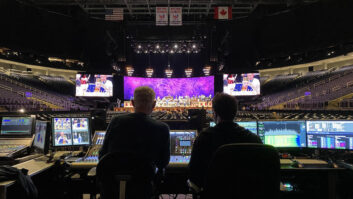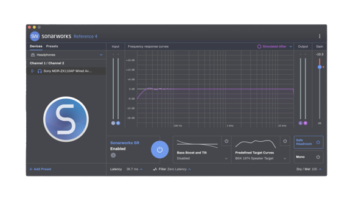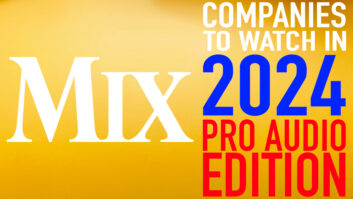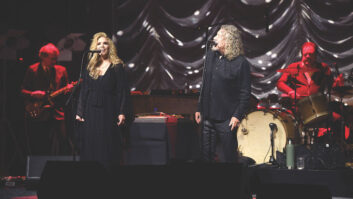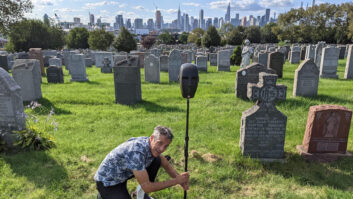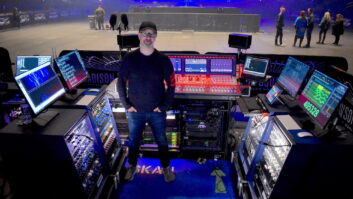Artist’s rendering of the upcoming MTK festival. Pic: CJ Rendering
In recent years, festivals have become an important part of the live sound landscape, creating destination events that provide a bargain for music fans while bolstering local economies. This year sees the debuts of nearly a dozen major fests, including Music To Know (MTK), set to take place August 13-14, in the well-to-do Hamptons outside New York City.
Aiming for a sell-out crowd of 9,600, MTK is serving up a wide selection of critically acclaimed acts like Vampire Weekend, Ellie Goulding, Bright Eyes, Matt & Kim, Cold War Kids, Chromeo, Ra Ra Riot, M. Ward, Tom Tom Club and others. At the same time, it also plans to cater to food aficionados—bringing in 13 noted gourmet food trucks from around the country—and followers of fashion, as it provides a retail area featuring the likes of Tory Burch, Topshop, Jack Wills, Madewell, Elizabeth & James and others.
We sat down with MTK founder Chris Jones to find out more about curating a fledgling festival, the challenges of mounting a rock fest in the Hamptons, and what fans, fashionistas and foodies have in common.
This year, it seems like there’s more new festivals than ever before. You’re part of this trend, so what do you think is behind it?
I’m English though I’ve lived in the States for many years, and during that time, I’ve seen many things from the United States go to England. Likewise, you see other things come back from the UK to the US; the whole festival scene is one of those trends we’ve seen coming the other way.
It’s gone away from people going out, listening to music and drinking lots of beer in a field, to being a day out for a family where there’s what I call ‘see, hear, smell, touch, taste’—there’s something for all your senses, being the music, the fashion, the food. If you read the UK newspapers, you’ll see “Wimbledon, Formula 1 and which festival are you going to?” all in the same breath. They’re seen as the day-to-day things that happen in the summer, and now we see the same thing happening in the US. So what you’re witnessing in terms of the upturn [of festivals] is the recognition that this sort of change is upon us.
While music is the key hook, it seems that MTK is placing a lot of emphasis on the fashion and food aspects as well.
The recent changes in the music industry, whether it’s iTunes or the independents, have meant that many of the bands today don’t need [major label] distribution in order to achieve that sort of success. So you come from an industry model that was imposing on the public to one that’s now exposing. You can expose your product—your music—through multiple forms, and that has many similarities to the fashion industry, which has obviously existed in that form for many years. And, to some extent, food as well, with the food revolution and the way in which foods from all over the world are now offered in all the major places in the world.
So all three industries, in my opinion, naturally fit together quite well; the consumer of one is increasingly the consumer of another. So to your point, the ability to curate the best from those different industries makes perfect sense–and that’s what we tried to do.
With the state of the economy, are festivals becoming popular because they give consumers more bang for the buck?
I think festivals have to be priced correctly. We’ve made a very conscious effort to price it in a bracket that makes sense for the customer. Obviously we’re in the Hamptons, where things are expensive and people go to fundraisers where they don’t think twice about dropping several hundred dollars.
But we’ve tried hard to aim this at a target audience that is in the sweet spot—i.e. the widest audience there is—and try to attract not just the younger generation with those bands, but also an older demographic that loves and follows music, and folks of (ahem) my age and over who recognize in some of the bands that we’ve got some of the bands I loved when I was growing up, like The Police, Talking Heads, XTC. You see a lot of those bands manifesting themselves in the music that we’ve curated.
But the important thing is to do it at a price point that allows everyone to enjoy it. If you work out our price point, we’re about 10 bucks a band over the course of two days, which is a great value. For many people on Long Island, they’ve never had the opportunity to experience anything like this, so hopefully it’s a long-lasting memory, an enjoyable day out and they will hopefully become our customers for many years to come.
As you mentioned, Long Island hasn’t really seen this kind of festival before. Back in 2003, Field Day, which hoped to get a crowd of 50,000, was ultimately denied permits from local governments and eventually was held in New Jersey. MTK has clearly gotten a lot further than that production ever did—-how did that come about?
We have a private/public partnership with the Town of East Hampton, so we have done this hand-in-hand with them. In all candidness, there has not been a single moment in that relationship where there’s been any difficult conversations. They’ve been an absolute pleasure to work with–very supportive.
We’re giving $100,000 to East Hampton charities; the money has already been given to the town of East Hampton, and the way that works is that the money is given ahead of the event. It’s tough times for everybody; there’s holes in their budgets, so as a part of this public/private partnership, [the Town of East Hampton sees] this not only as an opportunity to bring business into the region, but to expose the region’s arts and culture, and also support the charities that have fallen on hard times. It’s been a true partnership with Supervisor Bill Wilkinson, and as a part of that, they’ve been fully supportive of everything that we’ve done.
In fact, the land that we’re staging the festival on is actually town land that we’re leasing from them, so it goes without saying that it wouldn’t be possible without that partnership.
Artists’ rendering of the MTK Festival grounds. Pic: CJ Rendering.
Speaking of the land, what is the space like?
It’s a large, natural amphitheater which is at the end of a decommissioned runway on the East Hampton Airport. We have a seven-acre site for the actual event, but it’s going to feel like you’re in an amphitheater—a concert hall as opposed to being in a big, open space, which sometimes has the effect of losing intimacy and atmosphere. We’ve very consciously tried to design space in a way that retains that feeling of being either under a big tent or in a big concert venue.
With the festival just under a month away, how’s it progressing?
Our ticket sales are right around where you’d expect them to be. [The typical attendee] is kind of a late buyer in this kind of market, which we knew about going in and you try to project for that. We’re hopeful that we’ll have 6,000 people on the field at any one time, which for us would be consistent with a near sell-out event. And we’re right on track. Our one-day tickets for Saturday are actually very close to selling out completely—which is a good situation for us!
MTK: Music To Know Festival
www.musictoknow.com
